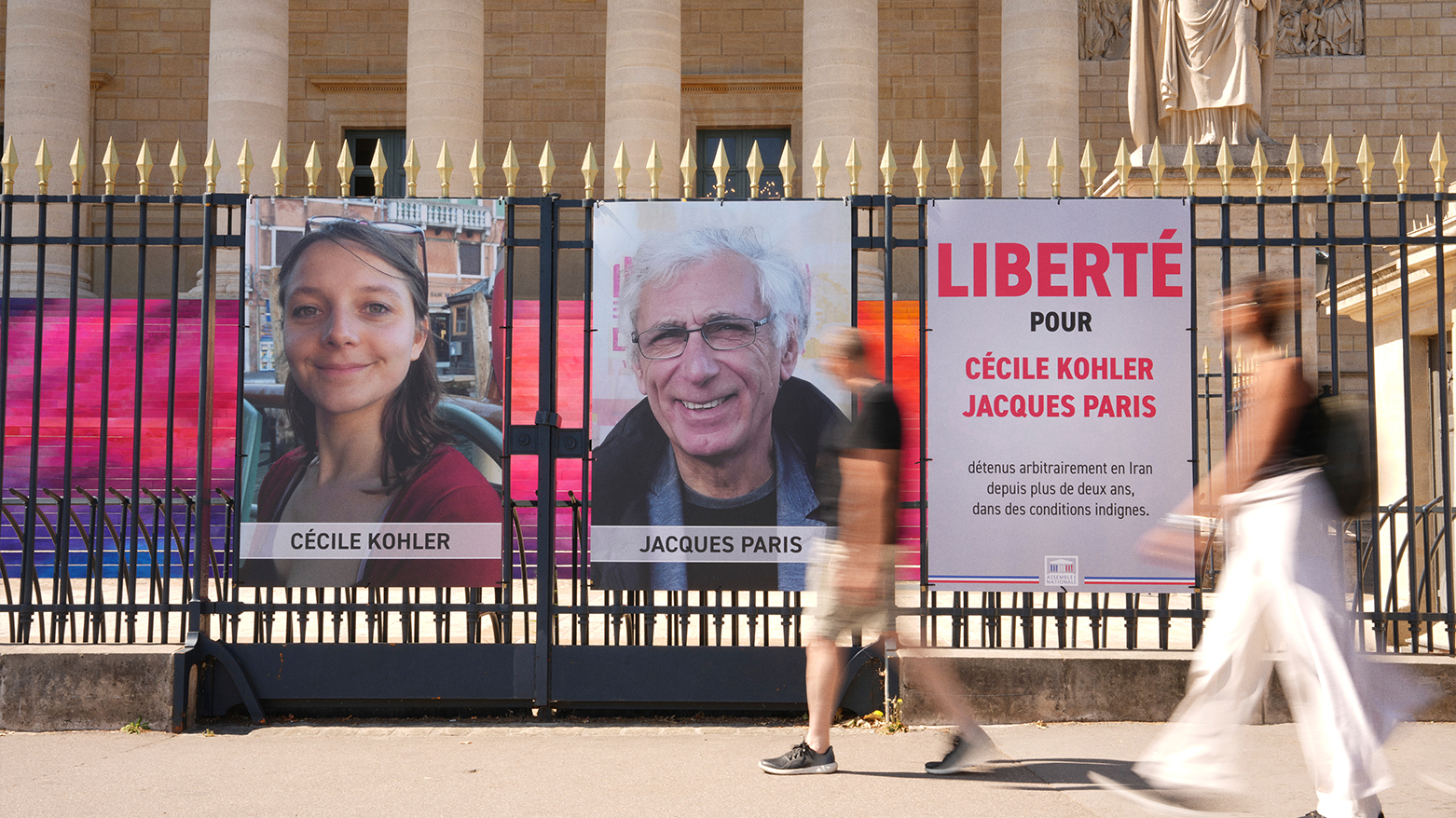France Slams Iran’s ‘Arbitrary’ Jail Terms, Demands Nationals’ Release
France has condemned Iran's lengthy prison sentences for two of its nationals, Cécile Kohler and Jacques Paris, calling the charges "unfounded."

ERBIL (Kurdistan24) - The French government on Thursday decried the "unfounded" charges and "arbitrary" lengthy prison sentences handed down to two of its citizens who have been detained in Iran since 2022, a move that has dashed recent hopes for their imminent release and plunged the already fraught relationship between Paris and Tehran into a new and more contentious phase.
Cécile Kohler and her partner, Jacques Paris, who have been held for more than three years in conditions their government has likened to torture, were reportedly sentenced this week to severe prison terms ranging from 10 to 20 years on a raft of espionage charges, including the grave accusation of assisting Israeli intelligence.
The French Foreign Ministry has demanded their "immediate release," rejecting the charges as a complete fabrication and renewing the long-standing accusation that Iran is using its citizens as political bargaining chips.
"I would like to spare a special thought for our compatriots Cécile Kohler and Jacques Paris, who have been detained for more than three years in Iran," French Foreign Ministry spokesperson Pascal Confavreux told reporters at a briefing on Thursday, as reported by France 24.
"Both were arbitrarily sentenced just the day before yesterday to very long prison terms. The charges against them, whatever they may be, are completely unfounded. We call for their immediate release."
The confirmation of the sentences, which were first reported on Tuesday by Iran's semi-official Fars news agency, came as a significant and deeply disappointing blow, particularly as it followed a period of cautious optimism.
Just a week prior, both Paris and Tehran had indicated that progress was being made in talks aimed at securing the release of the French detainees, with a potential prisoner swap seemingly on the horizon.
According to a report from the Iranian judiciary's official outlet, Mizan Online, the verdicts were handed down following what Tehran described as "comprehensive judicial proceedings." While the Fars report did not specifically name Kohler and Paris, the details of the sentences align with the severe charges they have been facing.
The court reportedly sentenced one French citizen to six years in prison for spying on behalf of France, five years for conspiracy to commit a crime against national security, and a staggering 20 years for assisting Israeli intelligence services.
The other French citizen was handed a 10-year sentence for spying for France, five years for conspiracy, and 17 years for aiding Israel. Under Iranian law, these sentences are to run concurrently, meaning the longest of the prison terms will apply in each case.
The case of Cécile Kohler, 40, and Jacques Paris, 72, has been a major point of contention between the two nations since their arrest on May 7, 2022. The pair, both academics, were detained at the end of what was meant to be a holiday in Iran.
They have been held ever since in Tehran's notorious Evin prison, a facility infamous for its harsh conditions and its use for housing political prisoners. France has repeatedly and vehemently protested their detention, stating that they have been denied proper consular protection and are being held in conditions "akin to torture," accusations that Iran has consistently denied.
The recent sentencing appears to be a cynical and calculated move by Tehran, part of a long-standing and widely condemned practice of "hostage diplomacy."
As noted by France 24, rights groups and Western nations have long accused Iran of using detained foreign and dual nationals as bargaining chips in its negotiations with the West, a charge that Iran also denies. Iran is currently believed to be holding approximately 20 European nationals, many of whom are facing similar, vaguely defined charges of spying or "collaborating with hostile states."
The timing of these particular sentences is especially significant, as it coincides with ongoing, and until now seemingly productive, negotiations for a prisoner exchange.
Iranian Foreign Minister Abbas Araghchi had recently revealed that an agreement to swap French prisoners in Iran for an Iranian national detained in France was "nearly complete." The proposed exchange reportedly involves Mahdieh Esfandiari, an Iranian student who was arrested in France in February of this year on charges of promoting terrorism on social media, according to French authorities. Tehran has consistently denounced her detention as "arbitrary," while simultaneously maintaining that its French detainees were engaged in genuine espionage activities.
The recent developments have been a rollercoaster of hope and disappointment. Last week, Iran released a 19-year-old French-German cyclist, Lennart Monterlos, who had been arrested on espionage charges in June, a move that was seen as a positive gesture and a potential precursor to a broader deal.
However, the subsequent handing down of these severe sentences against Kohler and Paris has thrown the entire process into doubt and has been met with anger and frustration in Paris.
France had previously attempted to use international legal channels to secure the rights of its citizens, bringing a case before the International Court of Justice (ICJ) and accusing Iran of violating the Vienna Convention on Consular Relations by denying French officials access to their detained nationals.
However, in a sign of its good-faith engagement in the prisoner swap negotiations, Paris later withdrew its request after the Iranian Foreign Minister's remarks suggested that a deal was imminent. The new sentences will be seen in Paris as a profound betrayal of that good faith.
The French government is now faced with a difficult and delicate diplomatic challenge. While it has issued a strong and public condemnation, the options for securing the release of its citizens are limited.
The case of Cécile Kohler and Jacques Paris is a stark and painful illustration of the human cost of Iran's geopolitical strategy, a strategy that continues to use the lives and freedom of innocent individuals as currency in a complex and dangerous international game.